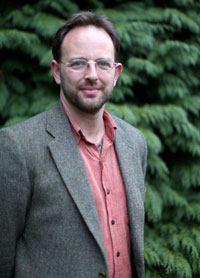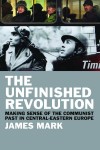Professor James Mark
Principal Investigator

James Mark is Professor of History at the University of Exeter and Principal Investigator on the 1989 after 1989 project.
Research
Most of his research has addressed the social and cultural history of state socialism and its collapse in central-eastern Europe, the politics of memory in the area during both socialism and post-socialism, or aims to connect the region to broader global histories and processes through transnational, entangled and comparative methods.
Publications
 He is the author of The Unfinished Revolution: Making Sense of the Communist Past in Central-Eastern Europe (Yale, 2010), which was shortlisted for the 2011 Longman History Today Book Prize and chosen as one of the ‘best books of 2011’ by Foreign Affairs.
He is the author of The Unfinished Revolution: Making Sense of the Communist Past in Central-Eastern Europe (Yale, 2010), which was shortlisted for the 2011 Longman History Today Book Prize and chosen as one of the ‘best books of 2011’ by Foreign Affairs.
The Unfinished Revolution is available through Yale University Press and was discussed by James Mark on BBC Radio 4’s Thinking Allowed.
 He is also co-author of Europe’s 1968: Voices of Revolt, published by Oxford University Press (2013) and Che in Budapest: Global Revolution in the Eastern Bloc (forthcoming).
He is also co-author of Europe’s 1968: Voices of Revolt, published by Oxford University Press (2013) and Che in Budapest: Global Revolution in the Eastern Bloc (forthcoming).
Books
with R Gildea, A Warring, Europe’s 1968: Voices of Revolt., Oxford, Oxford University Press, 2013.
with R Gildea, Voices of Europe’s ’68 (Special Issue of Cultural and Social History), 2011.
The Unfinished Revolution: Making Sense of the Communist Past in Central-Eastern Europe, London and New Haven, Yale University Press, 2010.
with P Apor, Che in Budapest: Global Revolution in the Eastern Bloc (forthcoming)
with M Bracke, ‘Between Decolonisation and the Cold War: Transnational Activism and Its Limits in Europe 1950s-1990s’ (special issue of the Journal of Contemporary History, forthcoming)
Articles
with R Gildea, N Pas, European Radicals and the Third World: imagined solidarities and radical networks 1958-73,Cultural and Social History, vol. 4, no. 8, Berg, 2011, 449-471
What Remains? Anti-Communism, Forensic Archaeology and the Retelling of the National Past in Lithuania and Romania, Past and Present, no. 206, 2010, 276-300
Antifascism, the 1956 Revolution and the politics of communist autobiographies in Hungary 1944 – 2000, Europe-Asia Studies, vol. 58, no. 8, 2006, 1209-1240
Society, Resistance and Revolution: The Budapest Middle Class and the Hungarian Communist State 1948-56, The English Historical Review, vol. 120, no. 488, 2005, 963-986
Remembering Rape: Divided Social Memory and the Red Army in Hungary 1944-1945., Past & Present, vol. 188, no. 1, 2005, 133-161
Discrimination, opportunity and middle-class success in early Communist Hungary., The Historical Journal, vol. 48, no. 2, 2005, 499-521
with R Gildea, “Introduction. Voices of Europe’s ’68’, Cultural and Social History, vol. 4, no. 8, Berg, 441-448
Chapters
with P Apor, Mobilizing Generation: The Idea of 1968 in Hungary, in von der Goltz A (eds) Talkin’ ’bout my generation. Conflicts of Generation Building and Europe’s 1968, Göttingen: Wallstein, 2011, 99-118
Adjusting Biographies: Explaining Communist Party Membership in Central-Eastern Europe, in Stephan A, Obertreis J (eds) Oral history and (post-)socialist socieities, Göttingen: Vandenhoeck & Ruprecht unipress, 2009
Antifascism, the 1956 Revolution and the politics of communist autobiographies in Hungary 1944 – 2000, in Cox T (eds)Challenging Communism in Eastern Europe: 1956 and its Legacy, , 2008
Containing Fascism: History in Post-Communist Baltic Occupation and Genocide Museums, in Sarkisova O, Apor P (eds) Past for the Eyes: East European Representations of Communism in Cinema and Museums after 1989, Budapest and New York: Central European University Press, 2008, 335-369
with B Tolmár, Connecting the Peaceful Roads to Socialism? The Rise and Fall of a Culture of Chilean Solidarity in Socialist Hungary 1965-1989, in ,
[Top]





